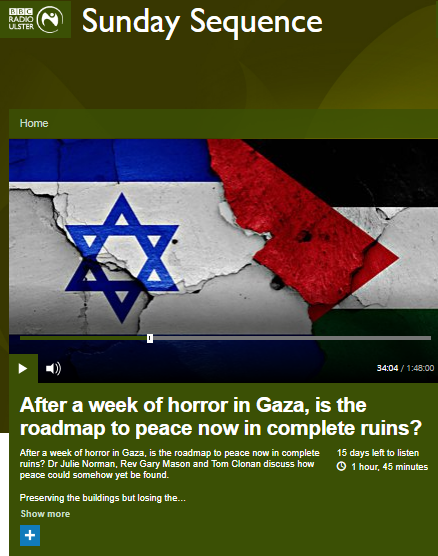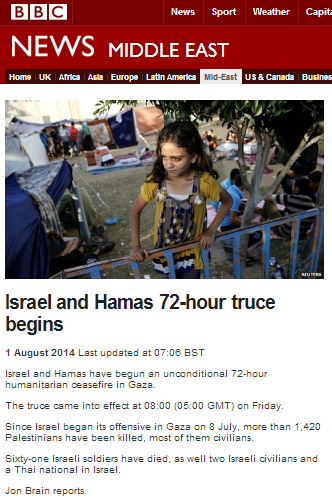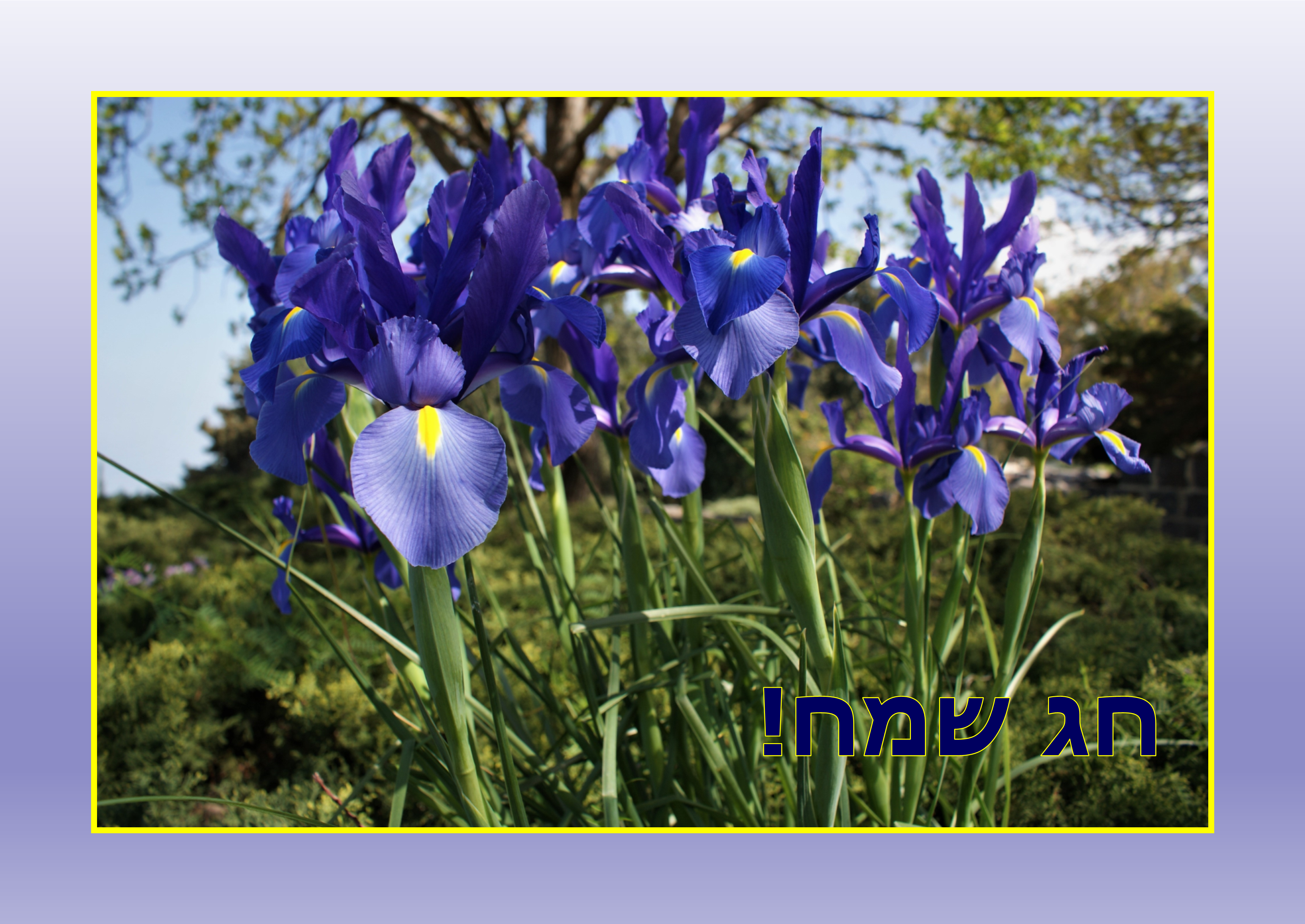While we have seen some problematic programmes relating to Israel on BBC Radio Ulster in the past, the May 20th edition of the station’s “religious and ethical news” programme ‘Sunday Sequence‘ included a long item (from 34:04 here and also aired on BBC Radio Foyle) which was even more remarkable than usual – not least because one contributor managed to shoehorn the Eurovision Song Contest, the 9/11 terror attacks, BDS, Salisbury and Iranian youth unemployment into the discussion.
“After a week of horror in Gaza, is the roadmap to peace now in complete ruins? Dr Julie Norman, Rev Gary Mason and Tom Clonan discuss how peace could somehow yet be found.”
Four days before this programme went on air a Hamas official had announced that fifty of those killed during the ‘Great Return March’ rioting on May 14th were members of Hamas. Prior to that, the Palestinian Islamic Jihad had claimed three of the dead. Information available to the public had already shown that some 80% of those killed since the pre-planned rioting began at the end of March were members of various terror factions in the Gaza Strip.
None of that information was communicated to listeners in presenter Roisin McAuley’s introduction to the item, or indeed in the rest of the broadcast. Listeners did, however, repeatedly hear the use of the term ‘Palestine’ – despite the fact that the BBC Academy’s “journalists’ guide to facts and terminology” states “in day-to-day coverage of the Middle East you should not affix the name ‘Palestine’ to Gaza or the West Bank”.
[emphasis in italics in the original, emphasis in bold added]
McAuley: “International attention is once again focused on the Israel-Palestine conflict. A hundred Palestinians were killed in Gaza border protests in the last month [sic]; sixty on last Monday alone. The UN human rights chief accused Israel of using wholly disproportionate force. Israel’s UN ambassador accused Hamas of using children as human shields. Peace seems further away than ever. The problem seems intractable: an adjective once applied to the troubles here and to divided societies elsewhere. Can those examples be followed? Where should peacemaking begin? To answer those questions our panel – Dr Julie Norman, research fellow at the George Mitchell Institute for Global Peace, the Rev Gary Mason, founder of ‘Rethinking Conflict’ and Tom Clonan, Irish Times security correspondent and former Irish Army officer who served with the United Nations Interim Force in Lebanon – UNIFIL – during the Israeli operation against Hizballah in 1996.”
With Tom Clonan having told his Lebanon stories to the media many times before, there can be no doubt that when the producers of this programme decided to invite Tom Clonan to participate, they knew exactly what listeners were going to hear next – and what not.
Clonan: “Operation Grapes of Wrath was a punitive operation against the people of South Lebanon – not just Hizballah – because Hizballah, in contravention to the laws of armed conflict, were deployed in and amongst the civilian population and Israel – contrary to the laws of international conflict and the Geneva conventions – declared southern Lebanon a free-fire zone and as a consequence hundreds of innocent men, women and children were killed. So that was the action – which was clearly illegal – targeting civilians.”
Obviously Clonan’s story has nothing whatsoever to do with the declared subject matter of this item, but within its first few minutes he has facilitated the establishment in listeners’ minds of the notion that Israel has a habit of ‘illegally targeting civilians’. Interestingly, Clonan had nothing at all to say about UNIFIL’s failure – at that time of 18 years – to fulfil its mandate of preventing Hizballah’s entrenchment in southern Lebanon or the terror group’s rocket attacks on northern Israeli communities that preceded the operation. Mispronouncing the name of the location, Clonan went on:
Clonan: “One of the consequences was that after the massacre at Qana which I attended that day – 112 men, women and children killed in one incident – a then relatively unknown Islamist extremist, Osama Bin Laden, declared a fatwa on the United States in which he cited Qana as the…one of the casus bellis [sic] and that four years later led to Mohammed Atta and others flying aircraft into the Twin Towers. George Bush announced a global war on terror, invaded Afghanistan and Iraq and the rest, as they say, is history.”
Absent from Clonan’s portrayal of a ‘massacre’ is the fact that Hizballah terrorists had fired missiles from the vicinity of the UN post at Qana, the fact that the UNIFIL personnel there had made no attempt to stop that repeated fire despite the fact that civilians were sheltering in their post and the fact that the deaths of the civilians was completely unintentional.
After BBC Radio Ulster audiences had essentially been told that the 9/11 terror attacks were Israel’s fault, Clonan continued, equating Israel with the Syrian dictator who uses chemical weapons against his own civilian population and presenting a highly debatable portrayal of the laws of armed conflict.
Clonan: “So I think when a state – whether it be Israel or Assad’s regime – when they decide to engage in an act of disinhibition [sic] and indiscriminate violence against civilians, I think they do so at their peril. There are four principles governing the use of force against civilians. Now they’re very, very simple and they’re universal. One of them is justification – in other words you can only use live ammunition in defence of your own life or in defence of those of your comrades. The next one is about minimum force – that’s the second principle; unarmed restraint by weight of numbers. The use of baton rounds, gas, something that people in Northern Ireland would be very familiar with from our shared history. The firing of live ammunition is…is…is so far down the line and the Israelis have so many non-lethal options open to them but instead they use the Givati Brigade, an infantry brigade of the Israeli military, to conduct what is essentially a police action – a bit like putting the parachute regiment into Derry – and with the predictable and consequent effect of shooting 1,360 people on Monday over a eight-hour period. I’ve calculated that is one person shot every 20 seconds.”
Making no effort to clarify to listeners that the casualty figures quoted and promoted by Clonan are sourced from the terror group that initiated, facilitated and organised the violence, McAuley then gave credence to his 9/11 allegations while inflating the significance of a conflict that is way down the list of the current major conflicts in the world.
[37:32] McAuley: “Tom, it’s quite clear that not only is this an intractable situation but you are saying that if you’re making comparisons with the war against Hizballah, it is very, very important because you spelt out the consequences of that. So I want to ask you, Julie, would you say that this is the most important as well as the most intractable problem facing the world today in terms of not wanting another war?”
Norman’s response [from 37:57] deliberately erased the fact that over 80% of those killed during the Gaza border rioting since March 30th were linked to terror groups.
Norman: “I would say the framing of this incident in comparison to what happened with Hizballah is even tricky because this wasn’t just Israel cracking down on Hamas. As Tom rightly pointed out this was largely a civilian-based protest. You had 40,000 people – elderly people, women, children – all kinds of people there. This was not just a Hamas protest although Hamas was involved in some of the organising.”
Neither Norman nor McAuley bothered to inform BBC Radio Ulster audiences that the overwhelming majority of those killed were males in their twenties and thirties – indicating that while indeed “elderly people, women, children” had been recruited to the publicity stunt, most of them were not directly involved in the violence. Again quoting Hamas figures, Norman went on:
Norman: “I would also point out also that what happened on Monday was not a one-time incident. What happened on Monday was following 6 weeks of protests at the border. In addition to those who were killed on Monday there were over 40 killed and over 9,000 wounded in the weeks leading up to Monday. This is an intractable situation. This kind of resistance and protest has been going on, will continue and unfortunately this type of response to the protests has also been consistent.”
Revealingly, neither Norman nor any of the other participants made any effort to clarify at point or later on in the item that those so-called ‘protests’ have included shooting attacks, IED attacks, firebomb attacks and infiltrations and attempted infiltrations of the border fence.
The second part of this post will address the rest of the item.




